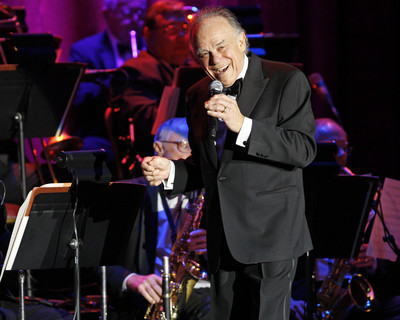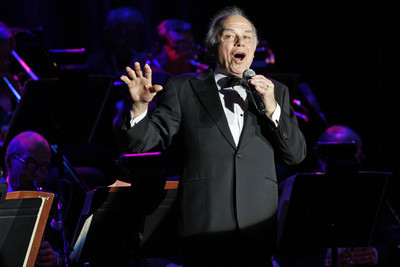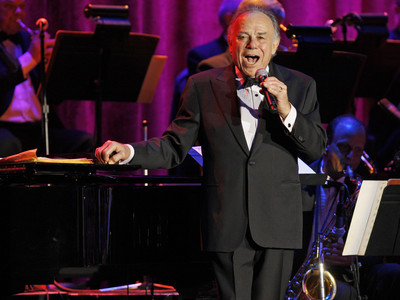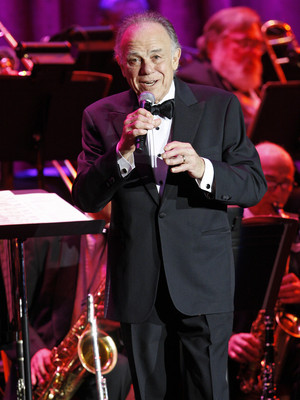Shunned by mentor Godfrey, singer enjoys long, diverse career
EDITOR'S NOTE: This is part of an occasional series of stories highlighting performers who played an interesting role in the history of entertainment in Las Vegas.
Julius La Rosa was a star before he was ready.
Discovered by radio and television legend Arthur Godfrey while singing in the Navy in 1950, La Rosa became a regular on Godfrey's national television shows after his discharge in 1951.
La Rosa immediately gained popularity, and in 1953 was publicly fired by Godfrey, who said he showed a lack of "humility." While it might seem embarrassing, La Rosa's career in nightclubs, recording, television and cabaret stage work in Las Vegas took off.
He described himself as "uncooked, that's the perfect word," when he headlined at the El Rancho Vegas in November 1955.
"I'd never been out on the stage until I was 21 years old, and I didn't know what the hell I was doing," he told me. "I grew up on radio and television where you went into the studio, where there were 500 people ... and they all listened while you sang. But you get into a saloon like in Las Vegas, and they don't listen, unless you can control them. And I had to learn how to do it!"
I asked La Rosa if he was nervous when he first appeared in Las Vegas. "I wasn't nervous," he replied. "I was scared to death!"
At the last minute, El Rancho officials wanted to back out on having La Rosa as a headliner. "The owners acceded to my nervousness," La Rosa said, "that if it did not destroy my confidence, it would break my heart. And my agency, General Artists Corporation -- they were a fairly powerful organization then -- told the owners, 'Just sweat it out with him.' And they allowed it. I was really terrible. I still didn't know how the hell to walk out on the stage!"
Appearing for two weeks with comic Buddy Hackett, La Rosa gleaned decent reviews, though he thought they were terrible. "I did maybe eight or nine songs," he recalled. "I didn't know what the hell an act was. But whoever was in charge gave me a list of songs I should sing, and I sang the list of songs they told me to sing.
"A lot of people came out to see this kid who had all this press about having lost his humility, and all that BS. And I met some of them, not all of them, but most of them, and they walked away if not disappointed I dare to say, but embarrassed for me because I didn't know what I was doing. ... I walked out on the stage in Las Vegas, and the audience talked until I could get their attention. And I never could do that in the beginning."
He recalled an incident that occurred earlier that year in New York.
"I worked with Ella Fitzgerald at the old Loew's State Theatre on Times Square -- it's still there, of course -- and I was the star of the show with 'added extra attraction Ella Fitzgerald.' And this was 1955. This was one of the great ladies of the business! I was in awe of being in adjacent dressing rooms with Ella Fitzgerald! And we would talk from time to time between shows, and in one of our conversations, I said, 'You know, I realize I have got a lot to learn.'
"And to that woman's everlasting credit, she said to this young, innocent kid, she said, 'Julius, it took me 10 years to learn how to walk out on the stage, and you have got plenty of time.' "
"They used to say I was shy," La Rosa added, chuckling. "I wasn't shy. I was scared to death. But it came out of shyness. ... But as Ella said, 'It took me 10 years to walk out on the stage.' It took me maybe -- 15 years!"
La Rosa would continue acting and singing in musical theater across the country, he hosted his own popular radio show for New York's WNEW as a disc jockey for 10 years beginning in the 1970s, and he had a recurring role on the daytime NBC soap opera "Another World" during the 1980s, for which he was nominated for a Best Supporting Actor Emmy award. He appeared in Las Vegas as recently as last month for the Joe Williams Scholarship Fund benefit for the College of Southern Nevada (prior to that he had performed in the Railhead at Boulder Station in 1998).
But La Rosa always figured he learned his craft the hard way.
He was born on Jan. 2, 1930, in Brooklyn, N.Y. After completing high school, he joined the Navy and was discovered singing at an enlisted men's club in Pensacola, Fla., by Naval Reserve officer Godfrey.
La Rosa became a regular on "Arthur Godfrey Time" in the mornings and "Arthur Godfrey and His Friends" on Wednesday evenings.
"Those were very exciting days," he recalled. "This was a brand new medium. As a matter of fact, it was at the time of the Godfrey-La Rosa episode that editorials around the country said that if anyone had any doubts of the popularity of the relatively new medium called television, look at what's going on with Godfrey and La Rosa."
As one of the "Little Godfreys," La Rosa was discouraged from seeking a manager to represent him. But his popularity was soaring.
La Rosa also was the first artist to sign with Cadence Records in 1952, a label started by Godfrey's orchestra leader, Archie Bleyer. Cadence released a couple of records by La Rosa before hitting gold with "Eh, Cumpari" in 1953. Suddenly, La Rosa was the "golden boy" of Godfrey's shows.
For that reason, it came as a shock when Godfrey fired the 23-year-old after he sang "Manhattan" on Oct. 19, 1953.
Charging La Rosa with a lack of "humility," Godfrey released him via the on-air radio portion that followed the TV show. It appeared to be vindictive, arrogant -- and a mistake. Godfrey's public and industry popularity plummeted as La Rosa's career bloomed.
What happened? Did Godfrey interpret La Rosa's agent as a threat? Was he jealous of his protege?
"That was so with 'The Old Man,' " La Rosa explained to me. "That's one of the reasons. If not jealous, I think the better word is envious. I was getting five (thousand) to six thousand letters a week, and I'd been on the block a week and a half. And he'd been doing it five to 10 years, two centuries, whatever, and he's getting three thousand letters a week."
By 1955, La Rosa hosted his own three-times-a-week summer television series, "The Julius La Rosa Show," and had recorded another hit record, "Domani." He began appearing on Godfrey's major rival's variety show, Ed Sullivan's "Toast of the Town," as well as numerous other variety shows. This would lead to appearances on straight dramatic live television shows in the 1950s.
And he continued to appear in Las Vegas, usually with Hackett. In March 1958, La Rosa headlined at the Sands with Hackett, the Copa Girls, and Antonio Morelli and His Musicians. He also worked the Desert Inn. La Rosa headlined the Sahara, both in 1967 and 1968, and again in 1971 (with Don Rickles). In 1969, La Rosa starred in the Riviera lounge with both Jackie Kannen and Jan Murray as his warm-up comedians.
But that first appearance at the El Rancho Vegas still haunts La Rosa. He remembered he had just completed a successful run at the nightclub La Vie En Rose in Manhattan, co-starring with Lillian Roth, when he came to Las Vegas that first time in 1955. Las Vegas crowds were quite different then from the so-called "sophisticated" club audiences in New York.
"That first time I played the El Rancho, one night early on, a couple of days into it, you know," La Rosa related, "I still didn't know what I was doing. And understandably audiences were less than completely attentive. And down in the corner, the upper left hand corner, I'll never forget it, two guys kept talking. And they weren't just murmuring, they were talking as if they were in a restaurant. So in the middle of one of the songs, I stopped singing, and I said, 'If you don't shut up, I'm gonna come over and rap you right in the mouth.' There was a big hush in the audience.
"After the show, the maitre d' comes by and says: 'You stupid S.O.B. You know who that was?' (They were a couple of members of the Mob.) And he tells me who they were, and said: 'You're lucky I went over to apologize. And you're lucky they didn't kick you out of here!' "
He has learned a great deal about the business since then and has earned a lot of respect. Critic Bob Harrington of the New York Post recently wrote that La Rosa is "one of the best male singers in the business. He's proven himself to be one of the great saloon singers of our time. ... His honesty and sincerity permit an emotionality virtually unique among male singers. ... La Rosa is an amazingly easy man to like onstage."
Among the songs La Rosa continues to perform is one he recorded many years ago, right after his dismissal from the Godfrey shows, called "The Big Bell and the Little Bell." It's a fable about two bells: a big bell that goes "bong, bong, bong" and a little bell that only goes "boink." The king chooses the little bell over the big bell to play at his wedding. Perhaps a story a bit synonymous with his own relationship with Godfrey, it is a song that is close to La Rosa's heart. "It's charming and delightful," he said, words that just may mirror his effect on his audience.





















